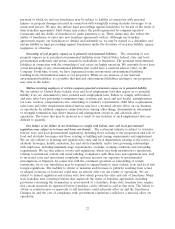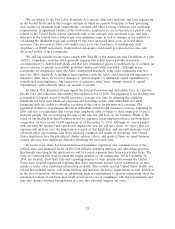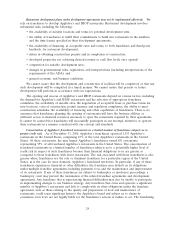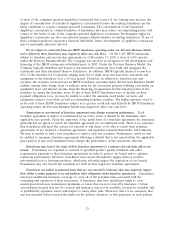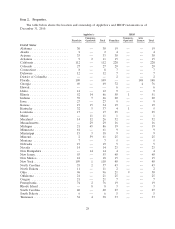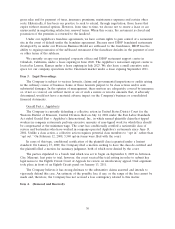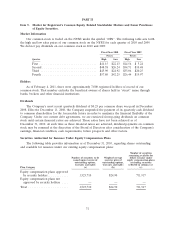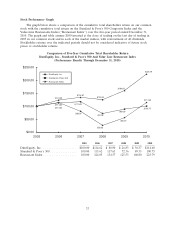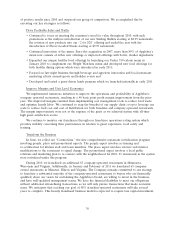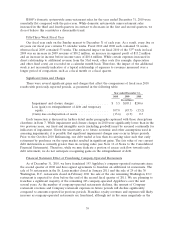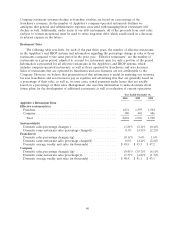IHOP 2010 Annual Report Download - page 46
Download and view the complete annual report
Please find page 46 of the 2010 IHOP annual report below. You can navigate through the pages in the report by either clicking on the pages listed below, or by using the keyword search tool below to find specific information within the annual report.
gross sales and for payment of taxes, insurance premiums, maintenance expenses and certain other
costs. Historically, it has been our practice to seek to extend, through negotiation, those leases that
expire without renewal options. However, from time to time, we choose not to renew a lease or are
unsuccessful in negotiating satisfactory renewal terms. When this occurs, the restaurant is closed and
possession of the premises is returned to the landlord.
Under our Applebee’s franchise agreements, we have certain rights to gain control of a restaurant
site in the event of default under the franchise agreement. Because most IHOP franchised restaurants
developed by us under our Previous Business Model are subleased to the franchisees, IHOP has the
ability to regain possession of the subleased restaurant if the franchisee defaults in the payment of rent
or other terms of the sublease.
We currently occupy our principal corporate offices and IHOP restaurant support center in
Glendale, California, under a lease expiring in June 2020. The Applebee’s restaurant support center is
located in Lenexa, Kansas under a lease expiring in July 2023. We also lease a small executive suite
space for our company operations in the Cincinnati market under a lease expiring September 2011.
Item 3. Legal Proceedings.
The Company is subject to various lawsuits, claims and governmental inspections or audits arising
in the ordinary course of business. Some of these lawsuits purport to be class actions and/or seek
substantial damages. In the opinion of management, these matters are adequately covered by insurance
or, if not so covered, are without merit or are of such a nature or involve amounts that, if adversely
determined, would not have a material adverse impact on the Company’s business or consolidated
financial statements.
Gerald Fast v. Applebee’s
The Company is currently defending a collective action in United States District Court for the
Western District of Missouri, Central Division filed on July 14, 2006 under the Fair Labor Standards
Act styled Gerald Fast v. Applebee’s International, Inc., in which named plaintiffs claim that tipped
workers in company restaurants perform excessive amounts of non-tipped work for which they should
be compensated at the minimum wage. The court has conditionally certified a nationwide class of
servers and bartenders who have worked in company-operated Applebee’s restaurants since June 19,
2004. Unlike a class action, a collective action requires potential class members to ‘‘opt in’’ rather than
‘‘opt out.’’ On February 12, 2008, 5,540 opt-in forms were filed with the court.
In cases of this type, conditional certification of the plaintiff class is granted under a lenient
standard. On January 15, 2009, the Company filed a motion seeking to have the class de-certified and
the plaintiffs filed a motion for summary judgment, both of which were denied by the court.
The parties stipulated to a bench trial which was set to begin on September 8, 2009 in Jefferson
City, Missouri. Just prior to trial, however, the court vacated the trial setting in order to submit key
legal issues to the Eighth Circuit Court of Appeals for review on interlocutory appeal. Oral argument
took place in front of an Eighth Circuit panel on January 13, 2011.
The Company believes it has strong defenses to the substantive claims asserted and intends to
vigorously defend this case. An estimate of the possible loss, if any, or the range of the loss cannot be
made and, therefore, the Company has not accrued a loss contingency related to this matter.
Item 4. (Removed and Reserved).
30




